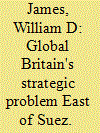| Srl | Item |
| 1 |
ID:
178501


|
|
|
|
|
| Summary/Abstract |
Why did Britain withdraw from its military bases in the Arabian Peninsula and Southeast Asia midway through the Cold War? Existing accounts tend to focus on Britain's weak economic position, as well as the domestic political incentives of retrenchment for the ruling Labour Party. This article offers an alternative explanation: the strategic rationale for retaining a permanent presence East of Suez dissolved during the 1960s, as policymakers realised that these military bases were consuming more security than they could generate. These findings have resonance for British officials charting a return East of Suez today under the banner of ‘Global Britain’.
|
|
|
|
|
|
|
|
|
|
|
|
|
|
|
|
| 2 |
ID:
103652


|
|
|
|
|
| Publication |
2011.
|
| Summary/Abstract |
There is broad scholarly consensus that the relative power of the United States is declining and that this decline will have negative consequences for international politics. This pessimism is justified by the belief that great powers have few options to deal with acute relative decline. Retrenchment is seen as a hazardous policy that demoralizes allies and encourages external predation. Faced with shrinking means, great powers are thought to have few options to stave off decline short of preventive war. Contrary to the conventional wisdom, however, retrenchment is not a relatively rare and ineffective policy instrument. A comparison of eighteen cases of acute relative decline since 1870 demonstrates that great powers frequently engage in retrenchment and that retrenchment is often effective. In addition, we find that prevailing explanations overstate the importance of democracies, bureaucracies, and interest groups in inhibiting retrenchment. In fact, the rate of decline can account for both the extent and form of retrenchment, even over short periods. These arguments have important implications for power transition theories and the rise of China.
|
|
|
|
|
|
|
|
|
|
|
|
|
|
|
|
| 3 |
ID:
156171


|
|
|